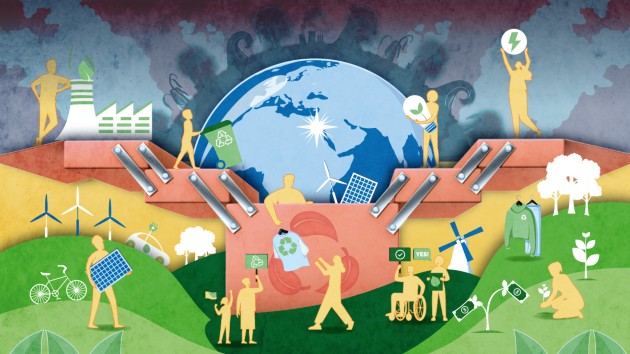Focus |
Collections
Filters
-
Collection Type
-
-
Focus |
 Climate change and human behaviour
Climate change and human behaviour
Anthropogenic climate change is a scientific fact. Without immediate action, we are unlikely to meet the target goal of minimizing global warming to 1.5° C. This collection highlights the importance of human behaviour in climate action, mitigation and adaptation.
Image: elenabs/iStock/Getty Images Plus/Getty; Irina_Strelnikova/iStock/Getty Images Plus/Getty; Mykyta Dolmatov/iStock/Getty Images Plus/Getty; Rudzhan Nagiev/iStock/Getty Images Plus/Getty; artpartner-images/The Image Bank/Getty. Banner design: Valentina Monaco and Bethany Vukomanovic. -
Focus |
 In the shadow of the war in Ukraine
In the shadow of the war in Ukraine
The Russian invasion of Ukraine has wreaked death and destruction in the country, with wide-ranging impacts on the global world order. This Focus highlights the experiences of Ukrainian scientists – at home and abroad – and provides insights into the many impacts of the war, including food insecurity, sanctions, disinformation, cyberwarfare, mental health, and the refugee crisis.
Image: Oleh Tiurkin / EyeEm / Getty -
Focus |
 COVID-19 vaccine inequity
COVID-19 vaccine inequity
Equitable distribution of resources to fight COVID-19 is a global challenge. This collection explores the ways in which global inequities in COVID-19 resource fuel the pandemic, and how we can address them.
Image: Andriy Onufriyenko / Moment / Getty -
Focus |
 COVID-19 and human behaviour
COVID-19 and human behaviour
Human behaviour has been critical in shaping the COVID-19 pandemic, and the actions of individuals, groups, nation states and international bodies all have a role to play in curbing its spread. This means that insights from behavioural and social sciences are and will continue to be invaluable throughout the course of the pandemic. In this Focus, we bring together expert viewpoints from a broad spectrum of disciplines that provide insight into the causes, impacts, and mitigation of the pandemic, highlighting how research on individual and collective behaviour can contribute to an effective response.
Image: GeorgePeters / DigitalVision Vectors / Getty -
Focus |
 PhDs under publication pressure
PhDs under publication pressure
Regardless of country and discipline, publications are an expectation – if not a requirement – to obtain a PhD. In this Focus issue, PhD students, academics and external stakeholders describe how this focus on publications leads to both, detrimental consequences but also benefits, for individuals and the scientific community. The 28 varied contributions include clear calls for future improvements of the system of support, training, and assessment of PhD students. The discussion is amplified with more contributions on the Behavioural and Social Science community forum (https://socialsciences.nature.com/channels/2140-is-it-publish-or-perish).
Image: mustafahacalaki / DigitalVision Vectors / Getty -
Focus |
 Social Sciences Replication Project
Social Sciences Replication Project
This focus presents original research evaluating the replicability of twenty-one social science experiments published in Nature and Science between 2010 and 2015 and the responses from eight authors of the original studies whose effects did not replicate (according to the criteria proposed by the replicating authors).
Image: Youst / DigitalVision Vectors / Getty -
Focus |
 Focus on Cooperation
Focus on Cooperation
Cooperation lies at the heart of human lives and society. Understanding how and when it succeeds and fails is key to solving global challenges. In this Focus issue, we pull together papers from across the journal's broad disciplinary scope to understand the state of knowledge on cooperation and highlight future research directions.
Image: Jane/Getty

 Navigating the AI frontier
Navigating the AI frontier